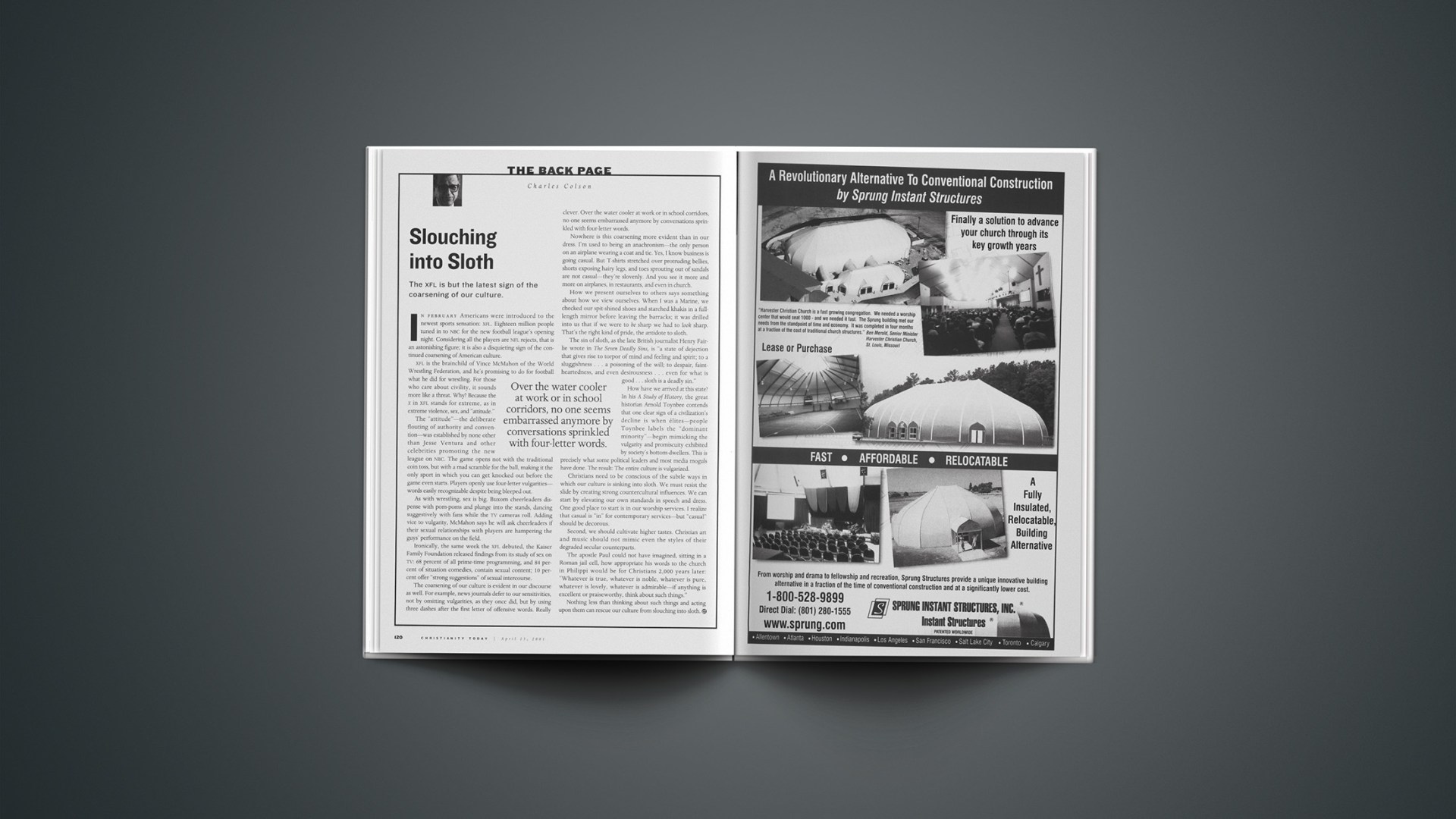XFL is the brainchild of Vince McMahon of the World Wrestling Federation, and he’s promising to do for football what he did for wrestling. For those who care about civility, it sounds more like a threat. Why? Because the x in XFL stands for extreme, as in extreme violence, sex, and “attitude.”
The “attitude”—the deliberate flouting of authority and convention—was established by none other than Jesse Ventura and other celebrities promoting the new league on NBC. The game opens not with the traditional coin toss, but with a mad scramble for the ball, making it the only sport in which you can get knocked out before the game even starts. Players openly use four-letter vulgarities—words easily recognizable despite being bleeped out.
As with wrestling, sex is big. Buxom cheerleaders dispense with pom-poms and plunge into the stands, dancing suggestively with fans while the TV cameras roll. Adding vice to vulgarity, McMahon says he will ask cheerleaders if their sexual relationships with players are hampering the guys’ performance on the field.
Ironically, the same week the XFL debuted, the Kaiser Family Foundation released findings from its study of sex on TV: 68 percent of all prime-time programming, and 84 percent of situation comedies, contain sexual content; 10 percent offer “strong suggestions” of sexual intercourse.
The coarsening of our culture is evident in our discourse as well. For example, news journals defer to our sensitivities, not by omitting vulgarities, as they once did, but by using three dashes after the first letter of offensive words. Really clever. Over the water cooler at work or in school corridors, no one seems embarrassed anymore by conversations sprinkled with four-letter words.
Nowhere is this coarsening more evident than in our dress. I’m used to being an anachronism—the only person on an airplane wearing a coat and tie. Yes, I know business is going casual. But T-shirts stretched over protruding bellies, shorts exposing hairy legs, and toes sprouting out of sandals are not casual—they’re slovenly. And you see it more and more on airplanes, in restaurants, and even in church.
How we present ourselves to others says something about how we view ourselves. When I was a Marine, we checked our spit-shined shoes and starched khakis in a full-length mirror before leaving the barracks; it was drilled into us that if we were to be sharp we had to look sharp. That’s the right kind of pride, the antidote to sloth.
The sin of sloth, as the late British journalist Henry Fairlie wrote in The Seven Deadly Sins, is “a state of dejection that gives rise to torpor of mind and feeling and spirit; to a sluggishness. … a poisoning of the will; to despair, faintheartedness, and even desirousness. … even for what is good. … sloth is a deadly sin.”
How have we arrived at this state? In his A Study of History, the great historian Arnold Toynbee contends that one clear sign of a civilization’s decline is when élites—people Toynbee labels the “dominant minority”—begin mimicking the vulgarity and promiscuity exhibited by society’s bottom-dwellers. This is precisely what some political leaders and most media moguls have done. The result: The entire culture is vulgarized.
Christians need to be conscious of the subtle ways in which our culture is sinking into sloth. We must resist the slide by creating strong countercultural influences. We can start by elevating our own standards in speech and dress. One good place to start is in our worship services. I realize that casual is “in” for contemporary services—but “casual” should be decorous.
Second, we should cultivate higher tastes. Christian art and music should not mimic even the styles of their degraded secular counterparts.
The apostle Paul could not have imagined, sitting in a Roman jail cell, how appropriate his words to the church in Philippi would be for Christians 2,000 years later: “Whatever is true, whatever is noble, whatever is pure, whatever is lovely, whatever is admirable—if anything is excellent or praiseworthy, think about such things.”
Nothing less than thinking about such things and acting upon them can rescue our culture from slouching into sloth.
Copyright © 2001 Christianity Today. Click for reprint information.
Related Elsewhere
See Colson’s earlier commentary against the XFL for his BreakPoint radio broadcast, “The XFL: Sex, Attitude, and Bad Football.”For more on the XFL, see Yahoo’s full coverage area.
Charles Colson’s columns for Christianity Today are available at our site, including:
Checks and (out of) Balance | Moral truth is in jeopardy when the courts enter the business of making law. (Feb. 27, 2001)
Pander Politics | Poll-driven elections turn voters into self-seeking consumers.(Jan. 3, 2001)
Neighborhood Outpost | Changing a culture takes more than politics. (Nov.8, 2000)
MAD No More | In this post-Cold War era, it’s time to rethink our nation’s defensive strategy. (Sept. 27, 2000)
Salad-Bar Christianity | Too many believers pick and choose their own truths. (Aug. 8, 2000)
A Healthy ‘Cult’ | A lively response by one unusual audience shows how God’s power transforms culture. (June 12, 2000)
The Court’s In Session | Are Christians ready to make their case? (April 25, 2000)
The Ugly Side of Tolerance | How to be offensive without really trying. (March 2, 2000)
Beating the Odds | Christians in two states defeat gambling by exposing its harmful effects on the poor. (Jan. 4, 2000)
Scout’s Dishonor | The judge told the Scouts just what their oath meant—and didn’t mean. (Nov. 15, 1999)
What Are We Doing Here? | (Oct. 4, 1999)










